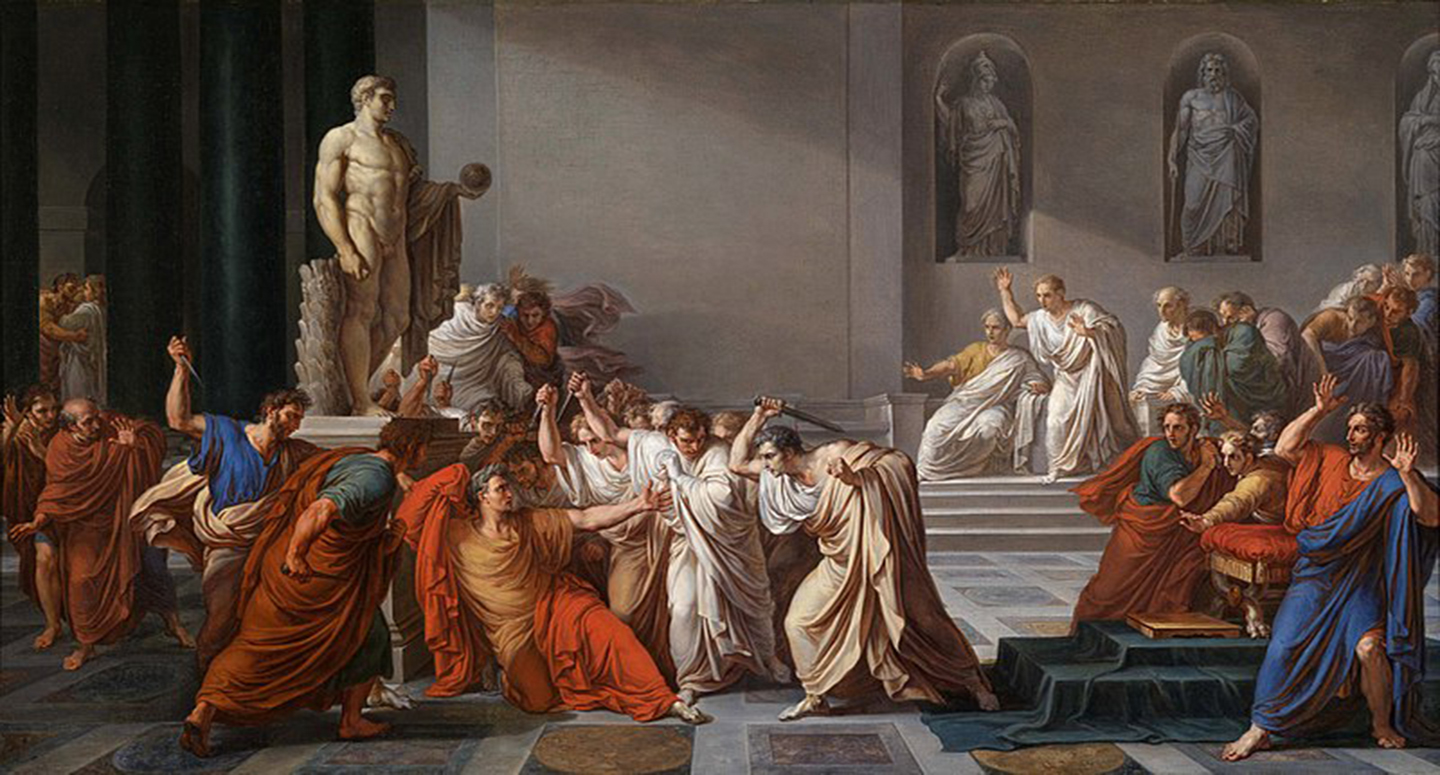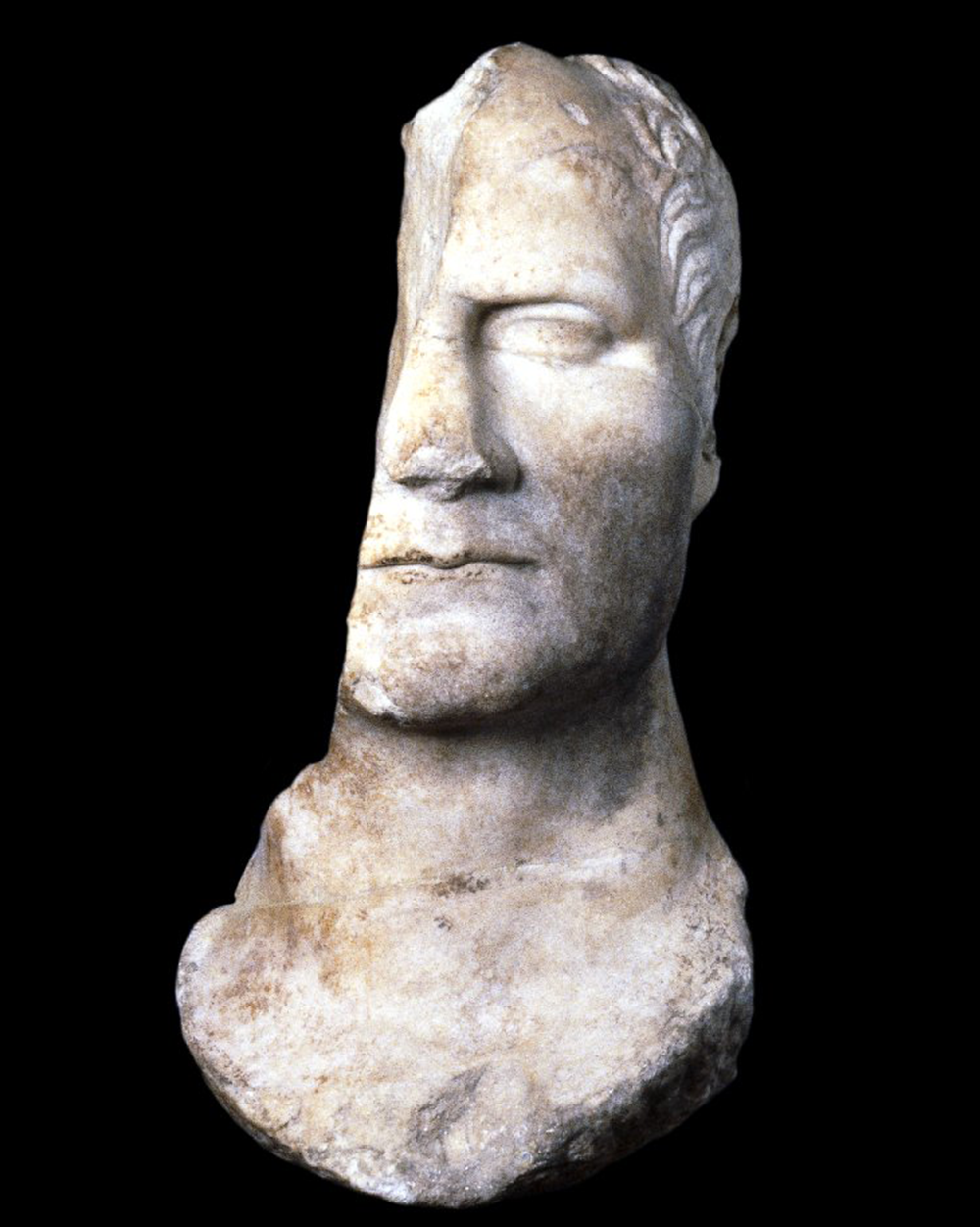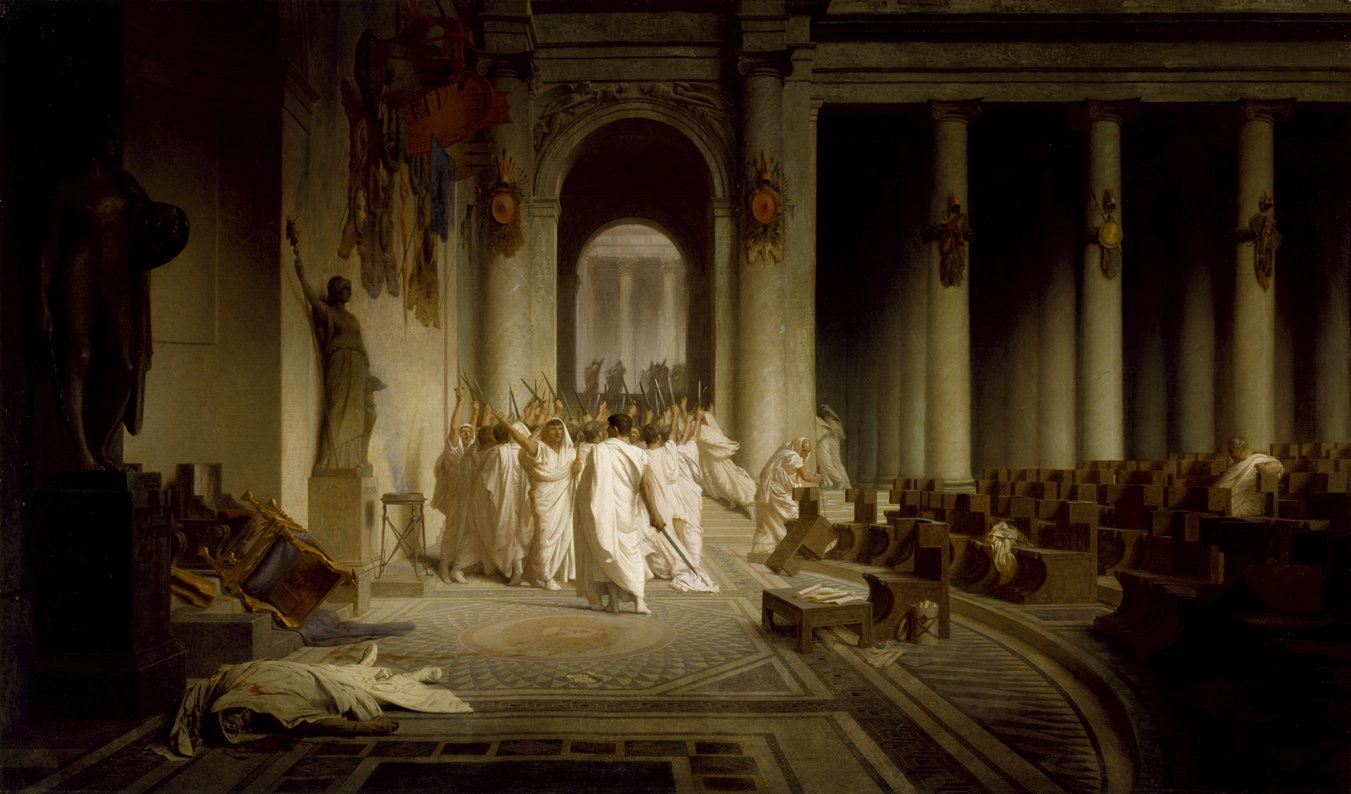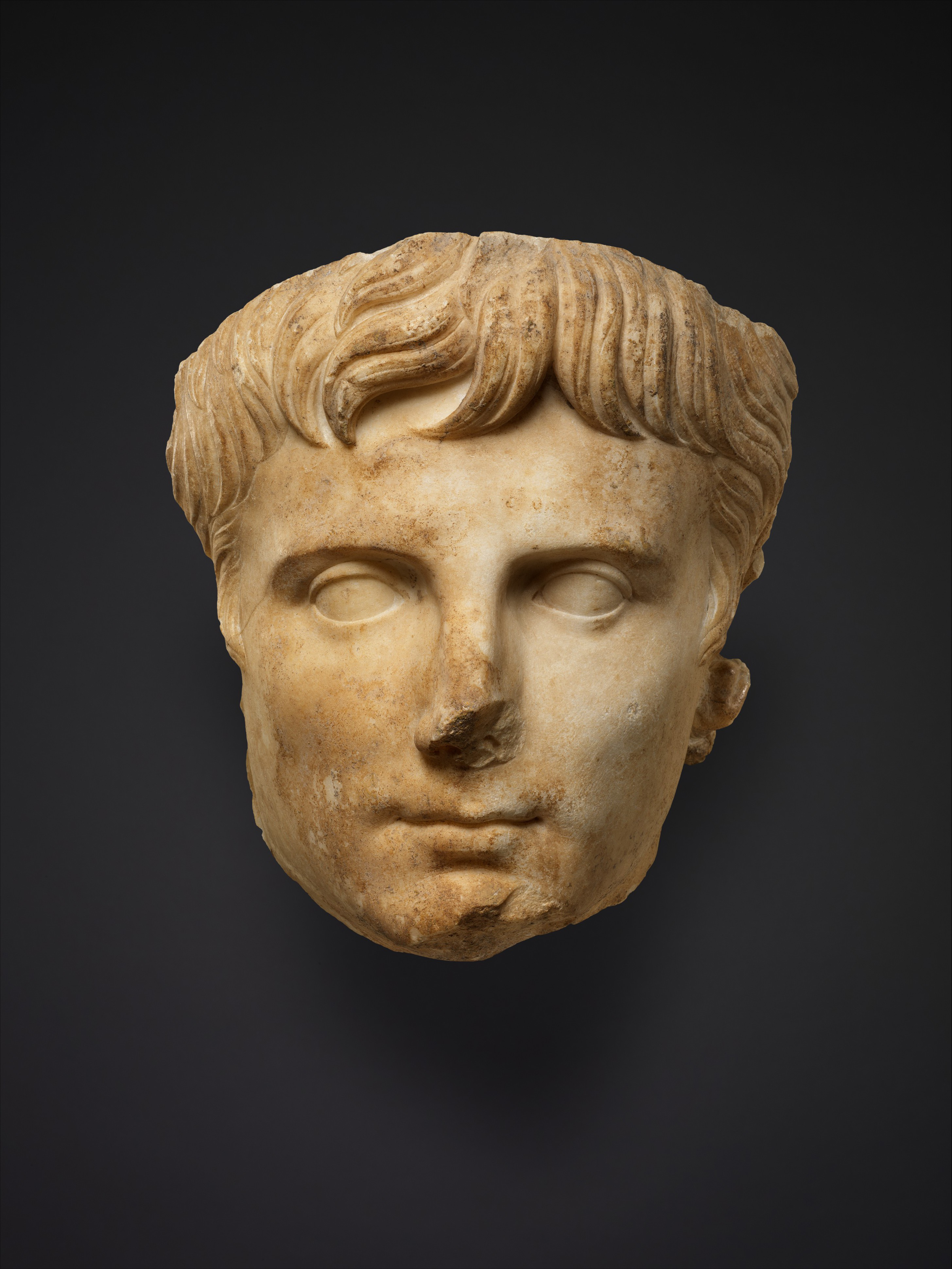
The Assassination of Julius Caesar, by Vincenzo Camuccini, c. 1804. La Galleria Nazionale.
Described by Cicero as “naked and lovely, with every oratorical ornament stripped away like clothing,” Julius Caesar’s prose was for generations the first piece of genuinely ancient Latin set in front of anglophone students. In addition to their relatively straightforward grammar, the dictator’s two books, the Gallic Wars (which remains required reading for high school students taking AP Latin) and the Civil War, benefit from their universally recognizable author and just-the-facts narratives. They offer something rare: an apparently sturdy foothold free of the obscure allusions and deliberately obtuse grammar that render so much Latin literature inaccessible to beginners.
A lavishly annotated and illustrated new English edition of Caesar’s corpus (including two anonymous texts that focus on Caesar’s later campaigns and imitate him in style), translated by Kurt Raaflaub and published in the esteemed Landmark series, positions his prose as material for an elegant intellectual coffee-table book. Those with memories of spending a semester of Latin class slogging through the military logistics and battle formations of the Gallic Wars, which covers eleven years of Caesar’s campaigns in the territory of the Gauls (modern France and Belgium, roughly) may stifle a yawn at the thought. But since the mid-twentieth century, the text has also been recognized by historians as a mix of imperialist ethnography and canny political propaganda.
Caesar’s other major work, the Civil War, applies the same general formula to an internal conflict, as its title suggests: the war between Caesar’s partisans and the senatorially backed Pompey the Great, from which Caesar emerged victorious. Likely published, unfinished, only after its author’s death in 44 BC, this later work covers the years 49–48 BC from Caesar’s perspective. Readers encountering the Civil War for the first time will be surprised above all by its omissions, including that of Caesar’s famous decision to lead a legion across a small Northern Italian stream called the Rubicon in January 49 BC, at the end of his second term as governor of Gaul. Roman law allowed only current holders of imperium, officially sanctioned military power that was limited in both time and space, to lead armies into Italian territory; his refusal to disband his troops upon entering Italy amounted to a declaration of war against the Roman government. Caesar knew this well, but you wouldn’t know it from his own account of the border crossing, which simply tells us that he “marched to Ariminum”—modern Rimini—from Gaul. Instead, as he does throughout the text, Caesar shifts the narrative to the Senate’s repeated refusals to agree to a solution that would allow him to keep his dignitas (a Roman concept that encompassed not only dignity in the modern sense but also political reputation) and to his own close relationship with his soldiers.

The crossing of the Rubicon is far from the only well-known scene from this war that Caesar underplays in the Civil War. His volatile personal relationships have made for compelling dramatic material from Shakespeare’s Julius Caesar to HBO’s Rome, but in his own account they are sanitized and almost invisible. When he discusses Pompey, his son-in-law and former ally turned bitter political rival, he is unfailingly polite. “Caesar,” he announces at one point—referring to himself, as always, in the third person—“had always promoted and supported Pompey’s honor and dignitas.” He mentions Cleopatra—the mother of his only son, who had accompanied him back to Rome in 47 and would not return to Egypt until after Caesar’s death—only twice, giving not a single hint that their interactions were anything but professional. Octavian, Caesar’s nephew and adopted son who would later assume the title Augustus, appears not at all.
Perhaps the most provocative question about both texts is that of Caesar’s imagined audience. It is generally accepted that Caesar wrote the Gallic Wars while in the field, promptly sending each completed book back to Rome to be published with the intention of keeping his name on his fellow citizens’ lips (and building up his reputation as a champion of the republic) during his long absence from the capital. Some historians have argued that Caesar believed the audience for this work to include not only his compatriots but also the Gauls themselves, serving as a warning to those who resisted and a kind of guide for those who chose to surrender and assimilate.
For the Civil War, the question of intended audience remains far more open. Caesar’s frequent use of inside-baseball political and military terms makes it seem likely that he expected his readers to be Romans of roughly his own background, with some experience in the Forum and on the battlefield. But who did he imagine would want to read the text? Unlike the wars in Gaul, the Roman elite did not need to be updated about the events of the civil war of the early 40s BC—willingly or not, they had witnessed it firsthand. Caesar himself is no help in the matter: the text both starts and ends abruptly, giving no general overview comparable to the opening of the Gallic Wars.
It is obvious, however, that Caesar had something more in mind when writing the Civil War than simply reporting the facts. It is hard not to read it as a careful legal defense, especially considering that Caesar had spent several years working as an advocate in the Roman court system as a young man. He does not lie outright—for the most part, he is considered a highly reliable source—but he is selective in his details and frequently justifies his own actions as if standing before a judge. “It was an unfair condition” for the Senate to demand that Caesar disband his personal army upon entering Italy when Pompey was allowed to keep his own, he tells us. It was Pompey’s unwillingness to talk things out face-to-face “that caused great despair about the possibility of a peaceful settlement,” making bloody civil war inevitable and, crucially, not Caesar’s fault.

This thread of self-justification running through the Civil War has led historians to consider it, like the Gallic Wars, to be a sort of propaganda, one that attempts to appeal to the old Republican values of dignitas and collegiality. But it is difficult to pin down just who Caesar was trying to convince. By 47 BC his political enemies in Italy had all been killed, fled to distant provinces where they would soon be hunted down, or, as far as Caesar knew, been swayed by his famous clemency and changed their loyalties. He had seized total and permanent control over the Roman government. Suetonius quotes him proclaiming that “the republic is nothing, a mere name without body or form” and that Romans should “regard my word as law.” According to contemporary observers like Cicero and later biographers, in the months before his assassination he even seems to have begun toying with the idea of himself as a god-king, the descendant of Venus and a living Romulus. If he was indeed still writing the Civil War at this point, why did he bother trying to prove that he was technically in the right?
When evaluating Caesar as a propagandist, it is impossible to avoid comparing him with his much longer-lived successor Augustus. The only extant piece of writing the latter personally composed is the short, autobiographical Res Gestae, but a corpus of poetry by Virgil, Horace, and Ovid and prose by the historian Livy is understood to have been carefully engineered to serve Augustus’ political ends. Certain themes appear throughout these texts: the ancient and divine ancestry of Augustus’ (and Caesar’s) clan, the Julii; old prophecies foretelling the doom of civil war followed by the rise of one chosen man (Augustus, naturally) who would usher in a new golden age; and, above all, the glorification of peacetime—a stark contrast with Rome’s past and future infatuation with the battlefield.
Caesar himself looms uneasily over Augustan literature. In the last book of Ovid’s Metamorphoses, a kaleidoscopic epic poem focusing on mythological transformations written before its author fell from the emperor’s good graces and was exiled, the narrative abruptly shifts from mythology to recent history.
Caesar is a god in his own land.
The first in war and peace, he rose by wars,
which closed in triumphs, and by civic deeds
to glory quickly won, and even more
his offspring’s love exalted him as a new,
a heavenly, sign and brightly flaming star.
Of all the achievements of great Julius Caesar
not one is more ennobling to his fame
than being father of his glorious son.
Ovid not only diminishes Caesar’s accomplishments by framing them as mere prologue to Augustus, he also condenses the whole of Caesar’s body of writing—the very things that Caesar thought justified his seizure of absolute power—into a few words: “he rose by wars, / which closed in triumphs, and by civic deeds.”
In his Aeneid, which establishes Augustus as the rightful heir of a line of Homeric heroes, the poet Virgil goes even further. When Aeneas visits the underworld, the shade of his dead father Anchises makes a prophecy covering all of Roman history up to Augustus. When he comes to the end of the Republic, he casts Caesar and Pompey as two sides of the same coin:
What war
they’ll rouse between them! Battles, massacres—Caesar,
the bride’s father, marching down from his Alpine ramparts,
Fortress Monaco, Pompey her husband set to oppose him
with the armies of the East. No, my sons, never inure
yourselves to civil war, never turn your sturdy power
against your country’s heart. You, Caesar, you
be first in mercy—you trace your line from Olympus—
born of my blood, throw down your weapons now!
By having Anchises judge the two equally responsible for dragging the state into bloodshed, Virgil does exactly what Caesar seems to have hoped to prevent with his Civil War: he renders Caesar’s careful, rational self-justification irrelevant.
In 1988 classicist Peter White summarized various proposed explanations for the apparent disrespect shown to Caesar in Augustan literature: “Perhaps Augustus was jealous of Caesar’s superior military gifts; perhaps he was uncomfortable about Caesar’s destruction of the Republic; anxious to divert attention from similarities between Caesar’s methods and his own; and so on.”

Perhaps a better answer is that Augustus was simply a cleverer, or more imaginative, propagandist. Augustus too had led one side in a brutal civil war, and he too had a great deal of Roman blood on his hands (including that of Cicero, killed in a political purge in 43 BC). Augustus nowhere justifies himself in terms of laws or politics, however. As he knew better than anyone, he was no longer subject to the judgment of his peers; after defeating Marcus Antonius in the Battle of Actium, he no longer had any peers. Though Augustus was certainly aware that he owed his position to Caesar’s machinations, he shows no interest in rehashing the finer points of his uncle’s dispute with Pompey and the Senate. Instead, his propaganda focuses outward, promising wonderful things to all Romans: peace, safety, prosperity, an end to the cycle of blame. Rather than a technical justification of the past and present, Augustus’s propaganda offered a future.
Julius Caesar, by contrast, dwelled on his past without offering a vision of how his blamelessness would translate into a better future for his contemporaries, whose entire lives had been marred by political violence or the threat of it. In an attempt to explain the mind-set of his assassins, some of whom had once been genuine friends of Caesar’s, historian Ronald Syme wrote that for them “the present was unbearable, the future hopeless.” It is unlikely (though certainly not impossible) that any of the conspirators had read any of Caesar’s still-unpublished Civil War, but if they had it would not have surprised or swayed them. If the text is indeed a piece of propaganda meant to justify Caesar’s autocracy, it must be judged an utter failure. It is much more dynamic as history, especially at a remove of two thousand years, even if the finer nuances are at risk of falling through the cracks when the narrative is taken at face value. Even the great dictator’s “naked” prose has plenty to hide.